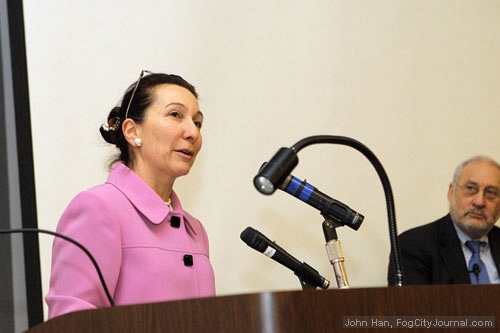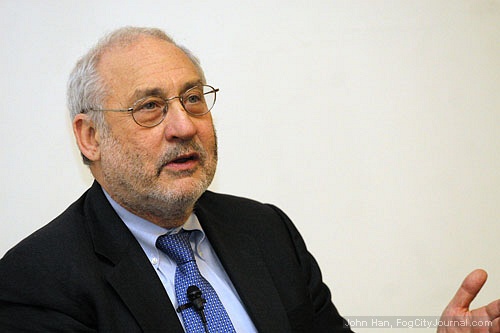
US budgeting expert Linda Bilmes and Nobel laureate Joseph Stiglitz spoke at UCSF School of Medicine earlier this week about the “true cost” of the U.S. occupation of Iraq and Afghanistan.
Photos by John Han
By John Han
March 7, 2008
Nobel prize winner Joseph Stiglitz and budget expert Linda Bilmes, co-authors of “The Three Trillion Dollar War,” spoke to medical professionals and students earlier this week at UCSF Medical Center about the “true costs of the Iraq conflict.”
March 20th will mark the 5th year of the US invasion of Iraq and Afghanistan. It is the second longest war in US history following the Vietnam War.
Nearly 4500 US troops have been killed in Iraq and Afghanistan, and as many as 60,000 military personnel have been been wounded.
Bilmes, a Harvard University professor and teacher of budgeting and public finance, says the total cost of the war so far is $600 billion.
Tip of the Iceberg
But that is just the “cash costs”, she says, meaning costs already spent for troops, transportation and medical care on the front lines, equipment, fuel, and paying over 100,000 private contractors employed in Iraq, as well as national guard and reservists.
She called the $600 billion figure “the tip of the iceberg.”
“There are the long term costs that we are going to have to pay even if we withdraw tomorrow,” Bilmes said. “Primarily, the extremely high cost of providing medical care to veterans, providing disability compensation to veterans.”
Troops returning home from Iraq suffer injuries including a high rate of blindness, deafness, traumatic brain injuries, burns, skin diseases and amputations, according to Bilmes.
She cites the Department of Veterans’ Affairs which estimates that they expect to face an overwhelming demand to treat 333,000 veterans returning from Iraq and Afghanistan.
According to Bilmes, current disability spending for veterans of the first Gulf War in 1991 is more than $4 billion a year. The war only lasted a month. And about $16 billion a year is spent on disability for veterans of the Vietnam War. That number, she says, is still climbing.
Based on Bilmes’ studies, 44 percent of veterans returning from Iraq and Afghanistan will need to receive disability benefits.
Additionally, costs such as paying interests on money borrowed to pay for the war and replenishing the military (which 88 percent of senior military officials surveyed said is strained), puts the estimate for US war spending in Iraq and Afghanistan at a whopping $25 billion per month.

Nobel laureate Joseph Stiglitz
Stiglitz, going beyond the budget, explains the socio-economic impacts of the war.
Financed by deficit
“This is the first time in American history, where as you go to war, you actually cut taxes,” he said. “The result of this is that this war is entirely financed by deficit, so the entire cost is being past on to future generations.”
Stiglitz said 40 percent of the money used to pay for the war is borrowed from foreign sources.
Stiglitz and Bilmes concluded that when the cost of what the US will owe is added to the $600 billion dollars already spent, the sum adds up to over $3 trillion. That’s a conservative figure, Stiglitz said.
“That’s so much money that it’s hard for most people to wrap their heads around. Well for one-sixth of the Iraq war you could have put the social security system on some footing for the next 50 to 75 years,” Stiglitz said.
Stiglitz said the US Government is spending more money than in previous wars on private contractors including Blackwater USA, whose mercenaries earn over twice as much US military personnel.
As far as the wars’ affects on people in Iraq, recent reports estimate that at least 100,000 Iraqi civilians have been killed as a result of the war.
Asked whether a new presidential administration is likely to significantly reduce war spending, Stiglitz said, “I hope so.”



 The Hunger Site
The Hunger Site
March 7, 2008 at 2:59 pm
Case – I tend to agree with you, additionally it is probably common knowledge that the war is expensive and the actual sum is irrelevant in the long run.
I feel that this and most other books on the subject are being published only when it is politically convenient to speak out. But you can’t blame an economist for predicting and timing the most effective moment to capitalize on something.
I am more worried about what we can do now and how to drag ourselves out of this mess.
March 7, 2008 at 11:19 am
While the cost of the war in Iraq is a worthy topic for some of our best economists, an even more important subject would be why we all face such absurd health care inflation, not just the pentagon….while 3 trillion is a large figure it still seems relatively manageable when compared to the health care costs of everyone else ….